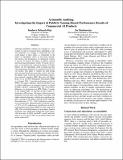| dc.contributor.author | Buolamwini, Joy | |
| dc.contributor.author | Raji, Inioluwa Deborah | |
| dc.date.accessioned | 2020-01-16T16:54:24Z | |
| dc.date.available | 2020-01-16T16:54:24Z | |
| dc.date.issued | 2019 | |
| dc.identifier.uri | https://hdl.handle.net/1721.1/123456 | |
| dc.description.abstract | Although algorithmic auditing has emerged as a key strategy to expose systematic biases embedded in software platforms, we struggle to understand the real-world impact of these audits, as scholarship on the impact of algorithmic audits on increasing algorithmic fairness and transparency in commercial systems is nascent. To analyze the impact of publicly naming and disclosing performance results of biased AI systems, we investigate the commercial impact of Gender Shades, the first algorithmic audit of gender and skin type performance disparities in commercial facial analysis models. This paper 1) outlines the audit design and structured disclosure procedure used in the Gender Shades study, 2) presents new performance metrics from targeted companies IBM, Microsoft and Megvii(Face++) on the Pilot Parliaments Benchmark (PPB)as of August 2018, 3) provides performance results on PPB by non-target companies Amazon and Kairos and,4) explores differences in company responses as shared through corporate communications that contextualize differences in performance on PPB. Within 7 months of the original audit, we find that all three targets released new API versions. All targets reduced accuracy disparities between males and females and darker and lighter-skinned subgroups, with the most significant up-date occurring for the darker-skinned female subgroup,that underwent a 17.7% - 30.4% reduction in error be-tween audit periods. Minimizing these disparities led to a 5.72% to 8.3% reduction in overall error on the Pi-lot Parliaments Benchmark (PPB) for target corporation APIs. The overall performance of non-targets Amazon and Kairos lags significantly behind that of the targets,with error rates of 8.66% and 6.60% overall, and error rates of 31.37% and 22.50% for the darker female sub-group, respectively. | en_US |
| dc.language.iso | en_US | en_US |
| dc.publisher | Conference on Artificial Intelligence, Ethics, and Society | en_US |
| dc.subject | algorithm, audit, ethics, intersectionality, AI, bias, race, gender | en_US |
| dc.title | Actionable Auditing: Investigating the Impact of Publicly Naming Biased Performance Results of Commercial AI Products | en_US |
| dc.type | Article | en_US |
| dc.identifier.citation | Raji, I & Buolamwini, J. (2019). Actionable Auditing: Investigating the Impact of Publicly Naming Biased Performance Results of Commercial AI Products. Conference on Artificial Intelligence, Ethics, and Society. | en_US |
| dc.contributor.department | Massachusetts Institute of Technology. Center for Civic Media | |
